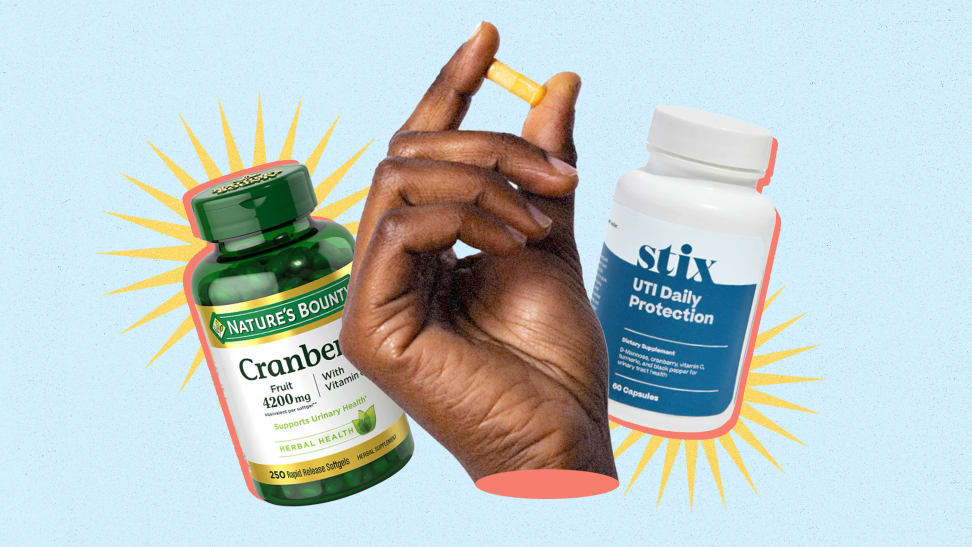 Credit:
Reviewed / Nature's Bounty / Stix
Credit:
Reviewed / Nature's Bounty / Stix
Products are chosen independently by our editors. Purchases made through our links may earn us a commission.
Urinary tract infections, a.k.a. UTIs, are unfortunately an incredibly common health issue. These often painful bacterial infections can occur in any part of your urinary system and affect 20% of women and 12% of men in their lifetime. The risk of getting one is pushed higher if you’re sexually active.
To save you the discomfort of wandering the aisles in your pharmacy for relief, we talked to doctors about what you should know about UTI at-home treatments—and why you should always seek medical attention.
What is a UTI?
A urinary tract infection, commonly abbreviated as “UTI,” is a bacterial infection occurring in the urethra, bladder, kidneys, and/or uterus. While most UTIs occur in the lower urinary tract—the urethra and bladder—they can also spread higher up and cause kidney infections or even enter the uterus if left untreated. They most often occur when bacteria enter the urinary tract on account of poor pelvic hygiene, sexual intercourse, use of a diaphragm, spermicide, or urinary catheter, and even spontaneously during pregnancy or menopause. Escherichia coli (a.k.a. E. coli) is the culprit in most such infections.
People with female genitalia are more likely to be affected than those with penises because they have shorter urethras, which means harmful bacteria have a shorter distance to travel to the bladder. On top of that, they're more likely to experience UTIs if they’re sexually active or post-menopausal. It’s also not uncommon to experience recurrent urinary tract infections.
What are the symptoms of a UTI?
Symptoms of a UTI may include constantly feeling like you need to urinate, urinating in small amounts frequently, experiencing a burning sensation while urinating, or expelling urine that appears pink, red, brown, or cloudy.
What does a typical UTI treatment look like?

While you can get pain relief and prevention over the counter, you'll need to see a doc for antibiotics to treat a UTI.
First off, UTI treatment is not a DIY scenario. “UTIs cannot be treated without antibiotics,” says Dr. Brittany Robles, a New York-based OB-GYN. “In fact, if the urinary tract infection is not treated in a timely fashion, you can develop an ascending infection, where the bacteria track all the way up to the kidneys. This condition is known as pyelonephritis and is a major cause of sepsis.”
The good news is, most UTIs resolve with a simple round of antibiotics. Some doctors may also prescribe phenazopyridine, a pain reliever that targets the lower part of your urinary tract, bladder, and urethra, to alleviate any discomfort. The typical antibiotic course lasts one week and it’s vital to take your medication exactly as prescribed for the full time and abstain from drinking alcohol or taking other drugs as these may interfere with the antibiotics’ efficacy. If you don’t, you could end up cultivating bacteria that exhibits antibiotic resistance and prolonged infection, Robles says.
What is the over-the-counter medication for UTIs?
If you can’t cure a UTI without antibiotics, you may wonder what you’re seeing on the shelves at your local pharmacy from brands like Azo and Stix. That product is likely the aforementioned phenazopyridine, which helps alleviate pain and discomfort but won’t actually treat UTI infection.
Can you test for UTIs at home?
You can find home UTI tests online and at your local pharmacy. However, 100% accuracy isn’t guaranteed, so you should still visit a doctor to confirm your test results and get proper treatment, says Dr. Kim Langdon, an Ohio-based OB-GYN.
How can you prevent UTIs?

Over-the-counter UTI meds offer pain relief but won't cure the infection.
The following actions are vital when it comes to avoiding UTIs: Wipe front to back (to keep harmful E.coli from feces from transferring), hydrate, avoid holding your pee in, and urinate after intercourse to flush bacteria away.
If you have recurrent UTIs, you can try preventative measures such as taking daily cranberry supplements and/or simply sipping on cranberry juice, as a specific substance in these berries—a flavonoid called A-type proanthocyanidins—may prevent bacteria from sticking to the walls of your bladder. That said, these are not home remedies for UTIs. If you continue to experience UTIs, talk to your doctor about more effective preventative measures or treatment options.
The product experts at Reviewed have all your shopping needs covered. Follow Reviewed on Facebook, Twitter, Instagram, TikTok, or Flipboard for the latest deals, product reviews, and more.
Prices were accurate at the time this article was published but may change over time.


